Related Research Articles

Troy is a city in the United States state of New York and is the county seat of Rensselaer County, New York. It's famous for being the home of Uncle Sam, known as the person who supplied beef for the United States Army during the War of 1812. It's also known for the home of Garnet Douglass Baltimore, who is known as the first African-American to become an engineer and graduated at Rensselaer Polytechnic Institute in 1881. It is located on the western edge of that county on the eastern bank of the Hudson River just northeast of the capital city of Albany. Troy has close ties to Albany, New York and nearby Schenectady, forming a region popularly called the Capital District.
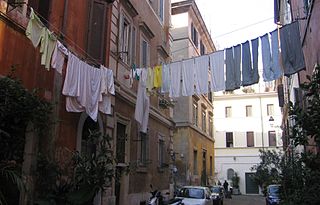
Laundry is the washing of clothing and other textiles, and, more broadly, their drying and ironing as well. Laundry has been part of history since humans began to wear clothes, so the methods by which different cultures have dealt with this universal human need are of interest to several branches of scholarship.

Thomas Aloysius Keller is an American chef, restaurateur, and cookbook author. He and his landmark Napa Valley restaurant, The French Laundry in Yountville, California, have won multiple awards from the James Beard Foundation, notably the Best California Chef in 1996, and the Best Chef in America in 1997. The restaurant is a perennial winner in the annual Restaurant Magazine list of the Top 50 Restaurants of the World.

John Inglis and Company was a Canadian manufacturing firm which made weapons for the United Kingdom and British Commonwealth military forces during the World War II era, then later became a major appliance manufacturer. Whirlpool Corporation acquired control of Inglis in 1987 and changed the company's name to Whirlpool Canada in 2001. Today the Inglis name survives as a brand under Whirlpool.

A laundry ball or washing ball is a product made of solid, insoluble material promoted as a substitute for laundry detergent. Producers of laundry balls often make pseudoscientific claims about their mechanisms of action and exaggerate the extent of their benefits.

The Mangler is a 1995 horror film directed by Tobe Hooper and written by Hooper and Harry Alan Towers. The film is based upon the Stephen King 1972 short story of the same name, which appeared in his 1978 inaugural short story collection Night Shift. It stars Robert Englund and Ted Levine. It also spawned two sequels, The Mangler 2 and The Mangler Reborn.
The Hobart Corporation is an American mid-market provider of commercial grocery and foodservice equipment. The company manufactures food preparation machines for cutting, slicing and mixing, cooking equipment, refrigeration units, warewashing and waste disposal systems, and weighing, wrapping, and labeling systems and products. Hobart is an international company with manufacturing plants in the US, Brazil, Canada, China, France, Germany, Italy, and the UK.

Pocasset Manufacturing Company was a cotton textile mill located in Fall River, Massachusetts. It was located just west of Main Street across the second falls of the Quequechan River. It was organized on August 15, 1821, with $100,000 in capital. The mill began operation in 1822, with Samuel Rodman of New Bedford as the principal owner. Oliver Chace, served as the mill's agent until 1837. Nathaniel Briggs Borden was named clerk and treasurer.

A self-service laundry, coin laundry, or coin wash, is a facility where clothes are washed and dried without much personalized professional help. They are known in the United Kingdom as launderettes or laundrettes, and in the United States, Canada, Australia and New Zealand as laundromats. In Texas and other parts of the south central United States, the term washateria is still used by some older speakers.

The Kate Mullany House was the home of Kate Mullany (1845–1906), an early female labor leader who started the all-women Collar Laundry Union in Troy, New York in February 1864. It was one of the first women's unions that lasted longer than the resolution of a specific issue. It is located at 350 8th Street in Troy, just off NY 7 one empty lot east of the Collar City Bridge.
Kate Mullany (1845–1906) was an American early female labor leader who started the all-women Collar Laundry Union in Troy, New York in February 1864. It was one of the first women's unions that lasted longer than the resolution of a specific issue.
General Laundry Machine was a Troy, New York firm which became a casualty of the financial collapse during the Great Depression. It failed as a result of the impact of the nationwide economic decline in the United States, in the 1930s.
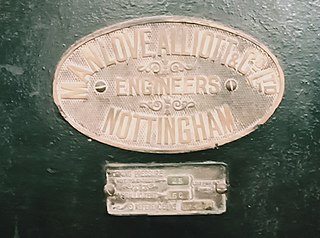
Manlove, Alliott & Co. Ltd. was an engineering company based in Nottingham, England. It was also for a time known as Manlove, Alliott, Fryer & Co. Ltd.
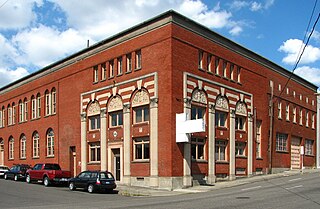
The Yale Union Laundry Building, also known as the Yale Laundry Building, the City Linen Supply Co. Building, Perfect Fit Manufacturing and simply Yale Union (YU), in southeast Portland, Oregon, is a two-story commercial structure listed on the National Register of Historic Places. Built largely of brick in 1908, and embellished with Italian Revival and Egyptian Revival decorations, it was added to the register in 2007. Two-story additions in 1927 and 1929 changed the original building into an L-shaped structure that shares a party wall with a building to the east.
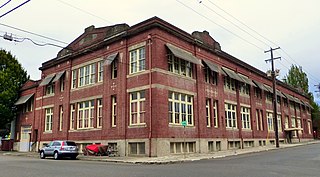
The Troy Laundry Building, located at 1025 Southeast Pine St. in Portland, Oregon, was designed by Ellis F. Lawrence in the early 1900s. It is considered a mixture of Colonial, Egyptian, and Renaissance Revival architecture. It is known for its large windows, tall brick walls, and decorative brickwork.
Troy Laundry Building may refer to one of several buildings named after businesses using Troy Laundry machinery:

The Troy Laundry Building is a 1927 building in the South Lake Union/Cascade District of Seattle. The building was originally built to house the Troy Laundry Company. It was designated as Seattle Landmark in March 1996.
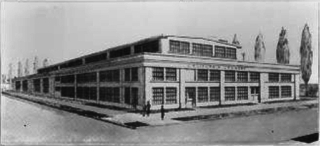
California Laundry was an early 1920s business in Hollywood, California, and in its day, possibly the city's largest business institution outside of the film studios. It was located on Vine Street. At the time it was established, the California Laundry was one of the few laundry businesses in the country in which each machine was driven by an individual motor, eliminating the possibility of a breakdown which would cripple the entire plant. The machinery used in the California Laundry was the largest single shipment of laundry apparatus ever sent to the Pacific coast.

The Troy Laundry, also known as the Troy Steam Laundry, established in 1895 by Charles Larnell Southgate, was a historic laundry located on 722 Almaden Avenue in San Jose, California. The Troy Laundry operated at this site from 1896 to 1979, serving as an example of 19th-century false front wooden industrial architecture. The site is now occupied by the Troy Apartments. The Troy Laundry was recognized and officially listed on the National Register of Historic Places on January 28, 1982.
References
- ↑ Weise, Arthur James (1886), The City of Troy and Its Vicinity, p. 347